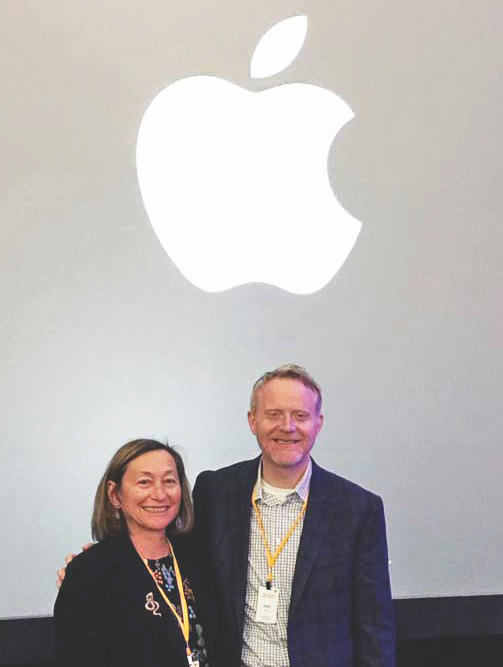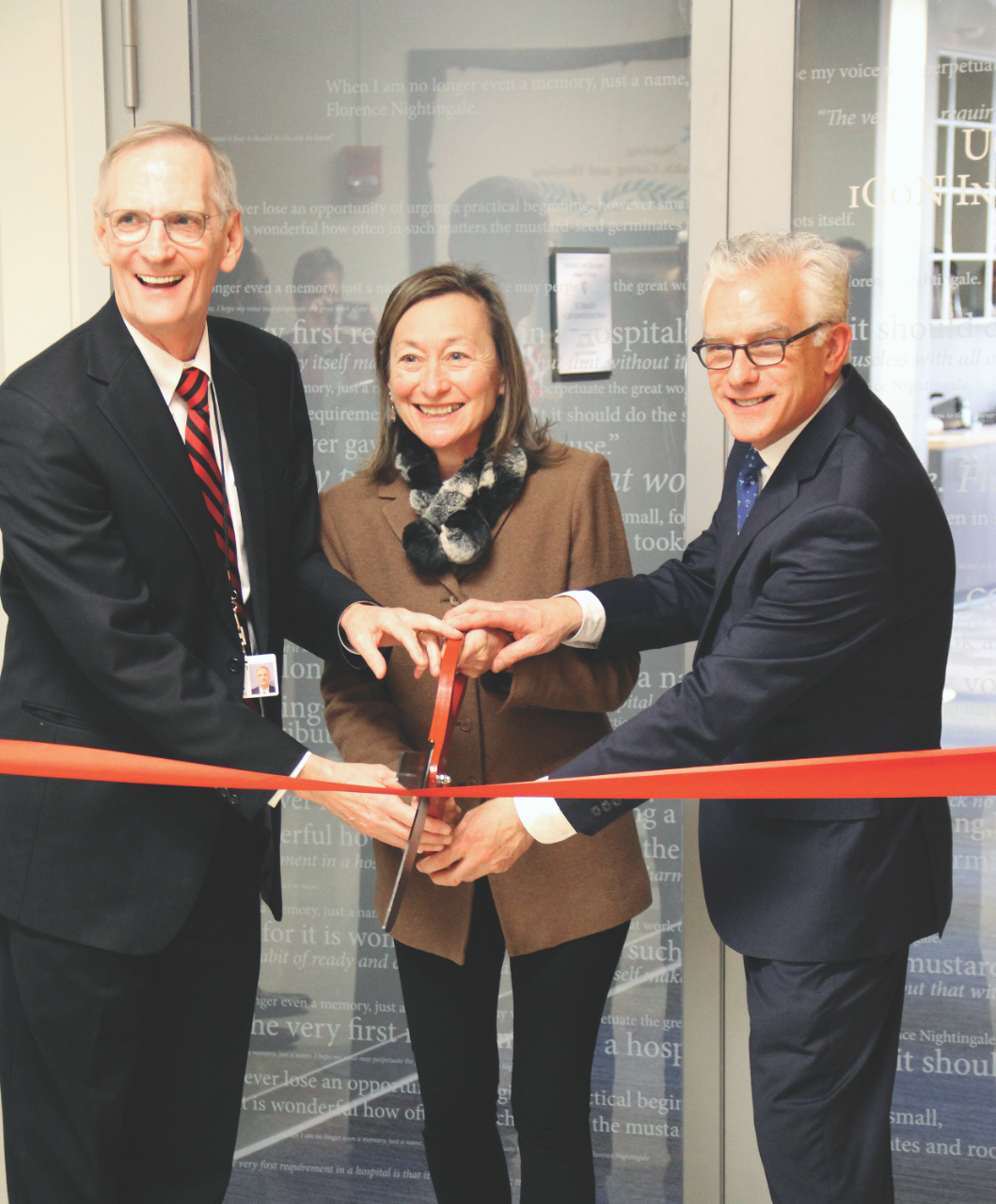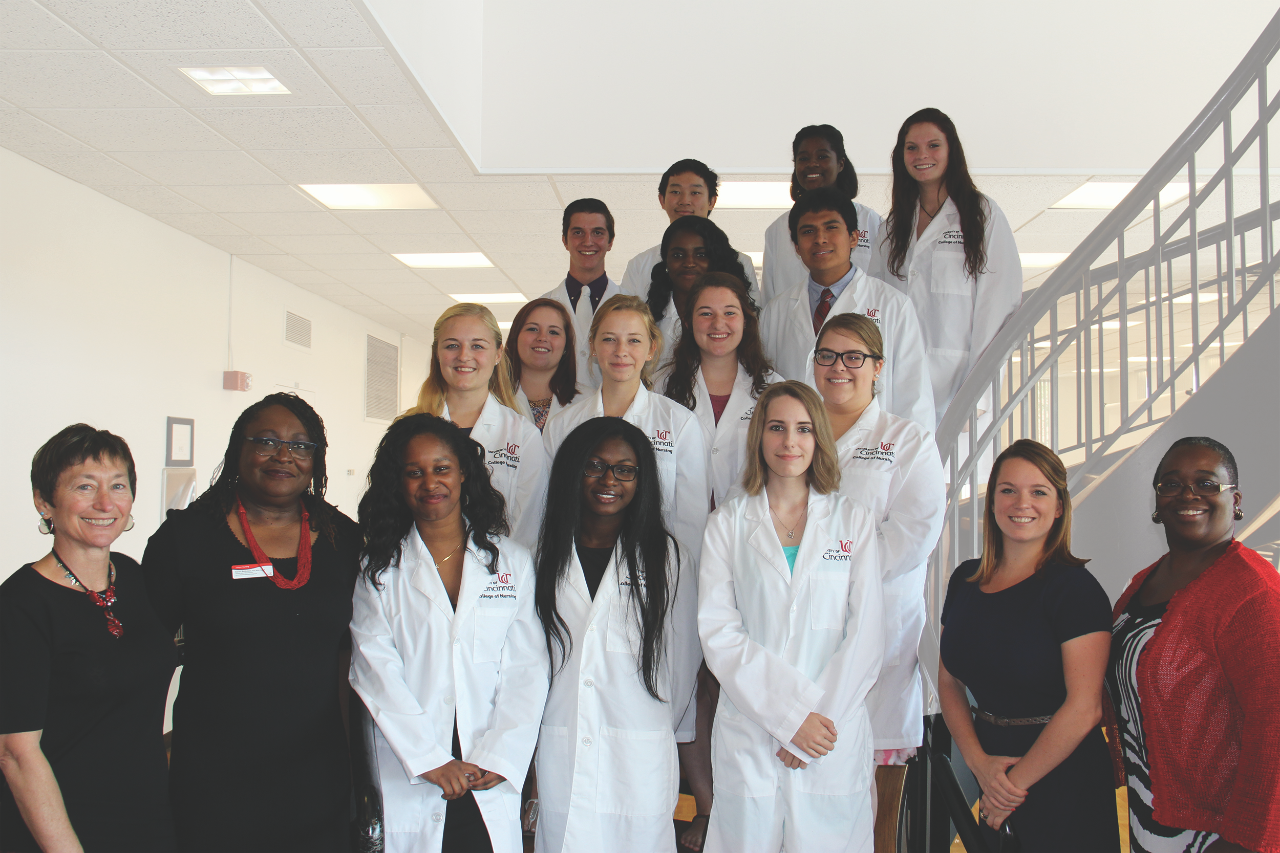
A term of transformation
Dean Greer Glazer retires, leaving behind a more innovative, inclusive and inspired college
When Greer Glazer became dean of the University of Cincinnati College of Nursing, she inherited a frayed, foundering organization. After an extended stretch without present or permanent leadership, the College’s cultural landscape had devolved into a top-down environment devoid of transparency and teamwork — no better exemplified than by the door that separated the administrative wing from the rest of the fourth floor of Procter Hall. Glazer took the door off the hinges and rolled up her sleeves, determined to make a change.
Her arrival was a crucible for the College. Not all employees appreciated her team-based approach and egalitarian leadership style. Some left. But the ones who stayed were ready for a change and believed Glazer could make it happen, based on her previous experience, zeal and forthcoming nature.
“She was active from the moment she walked onto campus,” says Krista Maddox, EdD, senior associate dean for student affairs. “We were lacking in leadership, so it was exciting to have someone with her caliber of expertise come in and get started.”
Glazer, PhD, RN, CNP, FAAN, who left her post as dean of the University of Massachusetts Boston College of Nursing and Health Sciences for UC, got to work gathering input from a swath of stakeholders to build a strategic plan from the ground up.
“Everyone had a part in talking about our strengths, our weaknesses, what we need to improve and what we should focus on. I think everyone felt like they were heard,” says Denise Gormley, PhD, RN, former senior associate dean for academic affairs.
With the exception of minor tweaks during Glazer’s almost 10-year decanal tenure at UC, that plan has held strong, thanks, in part, to the fact that it reflected the values of all those involved, Gormley says. “She was able to really move us along, but also include us very much in the direction of the College.”
Glazer retired June 30; Gormley was appointed interim dean while the university conducts a
nationwide search for Glazer’s replacement.
The strategic plan Glazer developed in collaboration with the College’s leadership team capitalized on strengths in teaching and technology and targeted improvement in community collaboration and diversity and inclusion, informing what is now the vision statement: “Through the creative leveraging of technology, innovation and inclusive excellence, UC College of Nursing will lead and impact the transformation of health care through strategic partnerships.”
With this vision at the forefront of all decision-making, the College has soared to a new level in nine years. Teaching and learning are even more interactive and immersive, admissions processes are more inclusive, support systems for underrepresented and first-generation
students have expanded and community collaboration and grant activity have increased.
Along with a vision, faculty, staff and students had a trusted leader to follow — one who led by example, who empowered them to lead in their own right, who provided open, honest feedback and who fought for them and the overall nursing profession.
“She’s vulnerable and she’s authentic,” says Matthew Rota, PhD, assistant dean for technology. “She brought us all along and she also told us the way it is. She was transparent as much as she could be. She didn’t take personal credit for the work of everyone. She uplifted people. I think that gave people a reason to follow her.”
She was active from the moment she walked onto campus. We were lacking in leadership, so it was exciting to have someone with her caliber of expertise come in and get started.
Krista Maddox, EdD
INNOVATION IN TEACHING AND LEARNING
Glazer supported innovative teaching and learning strategies at the undergraduate and graduate levels — from adding online program offerings to leveraging technology in classrooms, renovating collaborative spaces and implementing immersive clinical experiences in the community.
All of this was done with students’ interests in mind, says Suzanne Perraud, PhD, RN, who served as senior associate dean for academic affairs from 2012 to 2017. “Greer’s belief in the need to prepare nurses to transform health care started with providing quality programming for students,” she says.

Former Dean Glazer and Matt Rota at Apple Conference in February 2018
Prior to Glazer’s arrival, the College offered one of the most extensive catalogues of online programs at the university. Soon after, Glazer oversaw transition of the RN to Bachelor of Science in Nursing (BSN) to fully online and several graduate programs to partial or fully online formats. And because of the College’s established strength in tech-enhanced learning, it maintained program quality and climbed in online program rankings, reaching No. 5 in 2017 for its online master’s programs (U.S. News & World Report) and No. 1 the same year for its online RN to BSN program (Affordable Colleges Online).
One of the most ambitious initiatives of Glazer’s tenure was the broad integration of Apple products into the College’s infrastructure and instructional culture. This required extensive planning and investment in new classroom equipment, an overhaul of courses and
days-long training for faculty and staff on how to use and incorporate iPad functions into teaching and learning. The initiative started in Fall 2013, requiring second-year BSN and incoming Doctor of Nursing Practice (DNP) students to have an iPad for course instruction, and expanded to include all BSN, on-site DNP and Accelerated Direct-Entry Master of Science in Nursing (MSN) students.
In the years since it launched, the initiative has evolved to allow for updated hardware and software, but the intent remains to create innovative, active learning environments and a cohesive tech community to transform nursing education. For its efforts, the College has earned the designation of Apple Distinguished School (formerly Apple Distinguished Program) since 2014, recently becoming the only nursing college in the country to
receive such recognition for the fourth time.
“Her commitment to infusing technology into the curriculum is one reason we’re such a leading College across the country,” Rota says.

UC Health iCoN Innovation Space Dedication
Glazer continued to support investments in technology for faculty, staff and students with additional updates to Procter Hall spaces. In 2016, she secured a $1.2 million contribution
from UC Health to renovate 7,200 square feet of space on the second floor, dedicated in early 2017 as the “UC Health iCoN Innovation Space.” Home to more than 40 faculty and staff, the space, designed to eliminate silos and increase collaboration, includes open offices, communal seating areas, conference rooms and private rooms for meetings, all with Apple technology embedded and available for use.
Glazer also built and leveraged partnerships with nearby health care systems to establish innovative dedicated education units (DEU) at UC Medical Center (UCMC) in 2014 and later at Cincinnati Children’s Hospital Medical Center and the Cincinnati VA Medical Center. This clinical instruction model, which Glazer previously implemented in Boston hospitals, pairs students with staff nurses in a single unit to foster immersive engagement in clinical practice settings. In five years, the number of DEUs grew from a single unit at UCMC to nine units at those three hospitals and 160 placement opportunities for BSN students.
INCLUSIVE EXCELLENCE & COMMUNITY ENGAGEMENT
As soon as she arrived at the College, Glazer prioritized inclusion — not only in the faculty, staff and student culture, but also in the way the College interacts with the broader community.
“She was very sincere about trying to be more inclusive. By that, I mean engaging with the community and finding more innovative ways to broaden exposure to nursing students as it
relates to health care in the region,” says Karen Bankston, PhD, FACHE, FAAN, who served as associate dean for clinical practice, partnership and community engagement, a position created by Glazer, from 2012 to 2017.
Glazer continuously focused on diversifying the health care workforce as a way to help reduce health disparities in the Greater Cincinnati region. To do this, Glazer aimed to admit more students from various backgrounds that reflect the community in which they serve. Out of the gate, three grant-funded initiatives spoke to this goal:
Leadership 2.0: Nursing’s Next Generation
Leadership 2.0, an academic and extracurricular enrichment program for underrepresented and first-generation BSN students, was established in 2013 with
$1 million in federal grant funding awarded to Glazer and Bankston. In 2017, the program graduated its first cohort of students; by that time, the first-to-second-year retention rate for underrepresented and first-generation students had improved from 33% to 95%. Funding ended in 2017, but the program’s success encouraged the College to embed and finance it long term.
Pathways for Emerging Health Care Leaders
The Pathways for Emerging Health Care Leaders pipeline program was established in
2013 to break barriers that prevent racially diverse, disadvantaged high school students from pursuing health care careers. By 2016, the College of Nursing had partnered with six Cincinnati-area high schools, as Glazer and Bankston received a $2.3 million federal grant that helped provide increased support to more students. Funding ended in July 2020, but the College and Cincinnati Public Schools plan to continue their partnership.
Urban Universities for HEALTH
In 2012, UC was selected by Urban Universities (UU) HEALTH as one of five demonstration sites to receive a four-year $400,000 grant to drive health workforce improvements and share best practices. Following initial success, in June 2016, UC extended the initiative for three years with a $300,000 grant and named Glazer the point person to oversee development of outreach programs to grow, recruit and retain diverse talent and focus on health disparities among targeted populations.

Leadership 2.0 students at their White Coat Ceremony in 2015
Within the College, Glazer leveraged research that shows holistic admissions increase student success, engagement, teamwork and diversity and spurred the adoption of such practices for graduate and undergraduate students. Prior admissions processes considered only applicants’ GPA and standardized test scores. The holistic admissions process added new measures for qualitative factors, such as empathy, compassion, leadership drive and more. Admissions teams also began considering socioeconomic and geographic factors that might have influenced accessibility to opportunities and lived experiences. In 2018, the College added multiple mini interviews (MMI) to the bachelor’s in nursing admissions process, requiring students to complete a series of short interviews to assess non-cognitive
attributes. MMI were also incorporated into the Nurse Anesthesia DNP program admissions process.
“Greer was key in changing the way we admit students,” Maddox says. “She was quick to question why we were doing what we were doing and was able to bring a lot of knowledge and foresight into where nursing was going.”
To help boost efforts to graduate a more diverse study body, Glazer formed valuable partnerships with alumni and community members to increase the number and dollar amount of scholarships, especially for underrepresented and first-generation students. In fiscal year 2020, College-sponsored student scholarships amounted to $1.1 million, more than double the previous fiscal year’s total.
Alongside her goal of diversifying the nursing workforce, Glazer recognized a need to focus on equity and inclusion as part of the College’s culture. In 2013, she established the Diversity Advisory Council, later renamed the Committee for Equity and Inclusive
Excellence (CEIE). The CEIE now includes faculty, staff, alumni and student members who follow a strategic plan and work toward promoting diversity, equity and inclusive excellence in the College’s culture and curriculum and toward creating safe spaces for conversations about race and cultural humility.
These efforts combined have earned the College the Higher Education Excellence in Diversity (HEED) award from INSIGHT into Diversity magazine annually since 2015.
RESEARCH
The College’s strategic plan and cultural transformation set in motion by Glazer also
impacted scholarship, boosting overall grant dollars and including more faculty in the mix.
“We had virtually no program grants,” before Glazer became dean, says Gordon Gillespie, PhD, DNP, RN, FAEN, FAAN, who became associate dean for research in 2018. Glazer has supported not only research faculty but also clinical educators and other faculty and staff in securing grants, many of which are program grants, or funds that support a specific project and are tied to project-based outcomes.
“Now, if a clinical educator wants to write a grant, they’ll get support,” Gillespie says. “She’s been much more inclusive in that direction, and she’s also done that for staff.”
Since 2012, the College has received more than $21.6 million in total grant funding —
$10.3 million in research grants and $11.3 million in program grants and is on track to its most successful funding year ever, as research and program grants approach $3.8 million for academic year 2021-2022. For her own part, Glazer’s five-year $2.3 million Pathways for Emerging Health Care Leaders grant represents the largest program grant since her arrival.
Donna Martsolf, PhD, RN, CNS, FAAN, who served as associate dean for research and
translation until she retired in 2016, says what most impressed her was that the College
followed Greer’s strategic plan. It “was not relegated to a shelf somewhere,” she says. “The plan actually mattered; my leadership in my areas of responsibility mattered; and,
working together, we could all contribute to the success of the College.”
Glazer has supported not only research faculty but also clinical educators and other faculty and staff in securing grants, many of which are program grants, or funds that support a specific project and are tied to project-based outcomes.
Gordon Gillespie, PhD, DNP, RN, FAEN, FAAN
INTO THE FUTURE
Glazer’s strategic plan and the improvements that followed created a culture of openness and empowerment among faculty and staff, contributing to student success. Clear goals and strategies fostered a more inclusive environment with established initiatives to prepare a more diverse and culturally humble group of nurses who are tech-savvy and workforce-ready. UC nurses graduate ready to lead and impact the transformation of health care, regardless of the title or position they hold.
All of this sounds like a massive undertaking, but for Glazer it boiled down to a simple goal: do what is best for students to, ultimately, improve outcomes for patients and communities. In an email announcing her retirement, Glazer said her decision was strictly personal and hopes her successor will carry on her vision.
“I am one to tell others to live their values and could not do differently in my own life,” she wrote. “… I plan on staying involved in the [College’s] leadership transition as I hope we can find a next dean who is tenacious and driven to do what is best for our students, faculty, staff and community.”
Inspired by Maya Angelou’s quote, “… people will forget what you said, people will forget what you did, but people will never forget how you made them feel,” Glazer strived to lift up others to better themselves throughout her time at the College.
“Greer sees a refined version of someone and encourages him or her to reach for it,” says Jennifer Ray, associate to the former dean. “I experienced this myself and witnessed this for countless others. It has been an absolute honor to serve alongside Greer.”
By: Laura Toerner
Tags
Related Stories
Monica Turner elected chair of UC's Board of Trustees
January 13, 2025
P&G executive Monica Turner was elected Chair of the University of Cincinnati Board of Trustees. Gregory Hartmann was elected Vice Chair, and Jill McGruder was elected as Secretary.
Bridging health care and legislation: How nursing expertise can...
January 7, 2025
When Rachel Baker, PhD, RN, a University of Cincinnati (UC) bachelor's and PhD in nursing graduate, joined the Ohio House of Representatives in January 2023, she looked forward to leveraging her relationship-building and advocacy skills, as well as using evidence-based and data-driven approaches to policymaking.
UC's record fall graduating class celebrates commencement
December 13, 2024
Thousands of family and friends filled Fifth Third Arena to celebrate the accomplishments of the fall class of 2024 at the University of Cincinnati.
